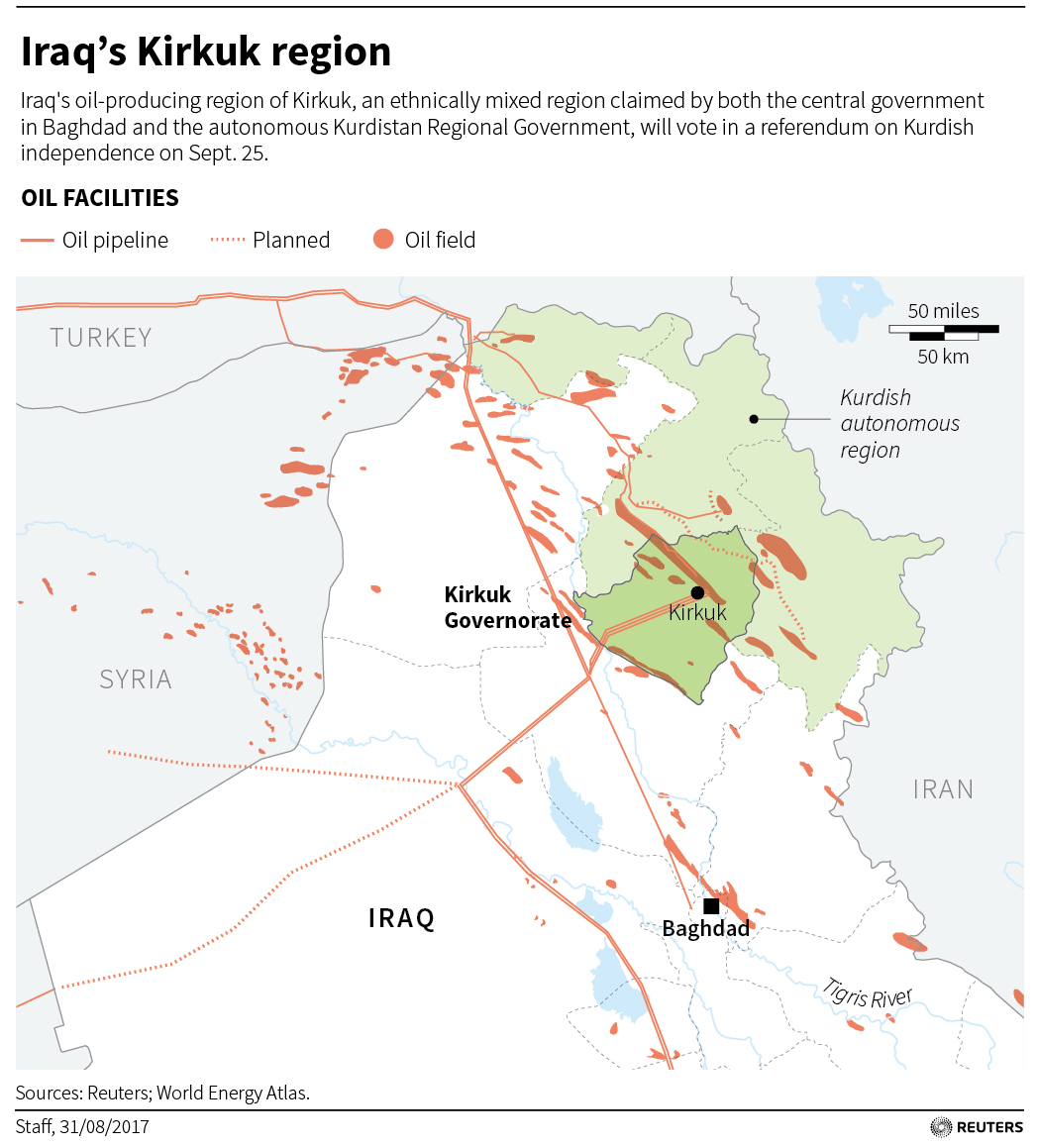
By Maher Chmaytelli
ERBIL, Iraq (Reuters) – The Iraqi government ruled out talks on possible secession for Kurdish-held northern Iraq on Tuesday and Turkey threatened sanctions after a referendum in the region showed strong support for independence.
Initial results of Monday’s vote indicated 72 percent of eligible voters had taken part and an overwhelming majority, possibly over 90 percent, had said “yes”, Kurdish TV channel Rudaw said. Final results are expected by Wednesday.
Celebrations continued until the early hours of Tuesday in Erbil, capital of the Kurdish region, which was lit by fireworks and adorned with Kurdish red-white-green flags. People danced in the squares as convoys of cars drove around honking their horns.
In ethnically mixed Kirkuk, where Arabs and Turkmen opposed the vote, authorities lifted an overnight curfew imposed to maintain control.
In neighboring Iran, which has a large Kurdish minority, thousands of Kurds marched in the streets to show their support for the referendum, defying a show of strength by Tehran which flew fighter jets over their areas.
The referendum has fueled fears of a new regional conflict. Turkey, which has fought a Kurdish insurgency within its borders for decades, reiterated threats of economic and military retaliation.
Kurdistan Regional Government (KRG) President Masoud Barzani says the vote is not binding, but meant to provide a mandate for negotiations with Baghdad and neighboring countries over the peaceful secession of the region from Iraq.
IRAQI OPPOSITION
But Iraq’s opposition to Kurdish independence did not waver.
“We are not ready to discuss or have a dialogue about the results of the referendum because it is unconstitutional,” Iraqi Prime Minister Haider al-Abadi said in a speech on Monday night.
The Kurds held the vote despite threats from Baghdad, Iraq’s powerful eastern neighbor Iran, and Turkey, the region’s main link to the outside world.
“This referendum decision, which has been taken without any consultation, is treachery,” Turkish President Tayyip Erdogan said, repeating threats to cut off the pipeline that carries hundreds of thousands of barrels of oil a day from northern Iraq to global markets.
He warned that Iraqi Kurds would go hungry if Turkey imposed sanctions and said military and economic measures could be used against them.
Iraqi Kurds – part of the largest ethnic group left stateless when the Ottoman empire collapsed a century ago – say the referendum acknowledges their contribution in confronting Islamic State after it overwhelmed the Iraqi army in 2014 and seized control of a third of Iraq.
Voters were asked to say ‘yes’ or ‘no’ to the question: “Do you want the Kurdistan Region and Kurdistani areas outside the (Kurdistan) Region to become an independent country?”
With 30 million ethnic Kurds scattered across the region, mainly in Iraq, Iran, Turkey and Syria, governments fear the spread of separatism to their own Kurdish populations.
Iraqi soldiers joined Turkish troops for military exercises in southeast Turkey on Tuesday near the border with Iraq’s Kurdistan region.
Turkey also took the Rudaw TV channel off its satellite service TurkSat, a Turkish broadcasting official told Reuters.
STATE DEPARTMENT
The U.S. State Department said it was “deeply disappointed” by the KRG’s decision to conduct the referendum but added that Washington’s “historic relationship” with the people of the Iraqi Kurdistan Region would not change.
Asked about the referendum, White House spokeswoman Sarah Sanders said on Monday: “We hope for a unified Iraq to annihilate ISIS (Islamic State) and certainly a unified Iraq to push back on Iran.”
The European Union regretted that the Kurds had failed to heed its call not to hold the referendum and said Iraqi unity remained essential in facing the threat from Islamic State.
The Kremlin signaled its opposition to a Kurdish breakaway in northern Iraq, saying Moscow backed the territorial integrity of countries in the region.
Iran banned flights to and from Kurdistan on Sunday, while Baghdad asked foreign countries to stop oil trading with the Kurdish region and demanded that the KRG hand over control of its international airports and border posts with Iran, Turkey and Syria.
Iranian Major General Yahya Rahim Safavi, a top adviser to the Supreme Leader, called on “the four neighboring countries to block land borders” with the Iraqi Kurdish region, according to state news agency IRNA.
Tehran supports Shi’ite Muslim groups that have ruled or held security and government positions in Iraq since the U.S.-led invasion that toppled Saddam Hussein in 2003.
Syria, embroiled in a devastating civil war and whose Kurds are pressing ahead with their own self-determination, rejected the referendum.
KRG Prime Minister Nechirvan Barzani said he hoped to maintain good relations with Turkey. “The referendum does not mean independence will happen tomorrow, nor are we redrawing borders,” he said in Erbil on Monday. “If the ‘yes’ vote wins, we will resolve our issues with Baghdad peacefully.”
British Foreign Secretary Boris Johnson reiterated London’s opposition to the vote, urging “all sides to refrain from provocative statements and actions in its aftermath.
“The priority must remain the defeat of Daesh and returning stability to liberated areas,” he added, a reference to Islamic State militants who continue to control parts of Iraq and Syria.
(Additional reporting by Ece Toksabay in ANKARA and Umit Bektas in HABUR, Turkey; Editing by Philippa Fletcher and Giles Elgood)









